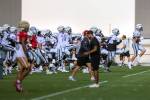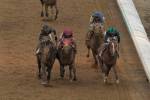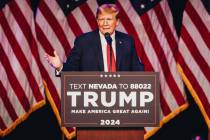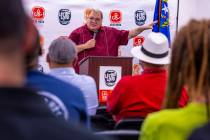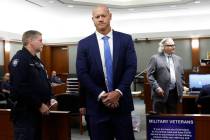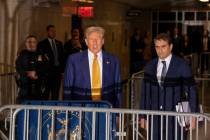Harry Reid leaving Senate with few regrets — and a legacy of serving Nevada

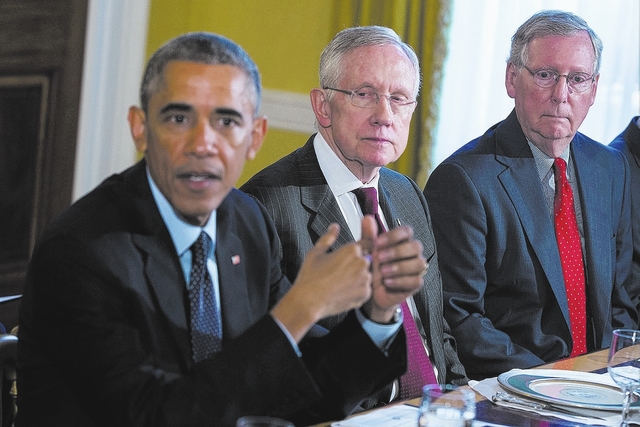

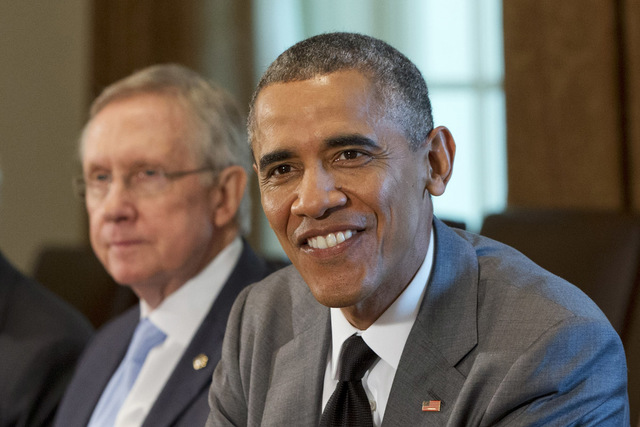



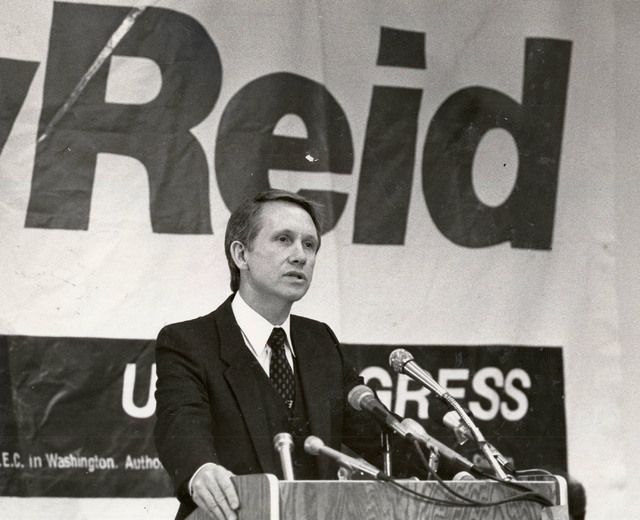
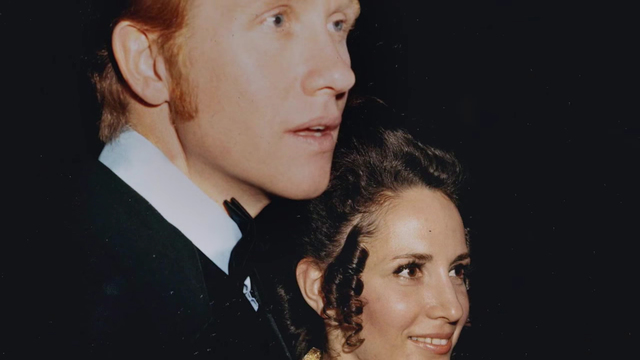

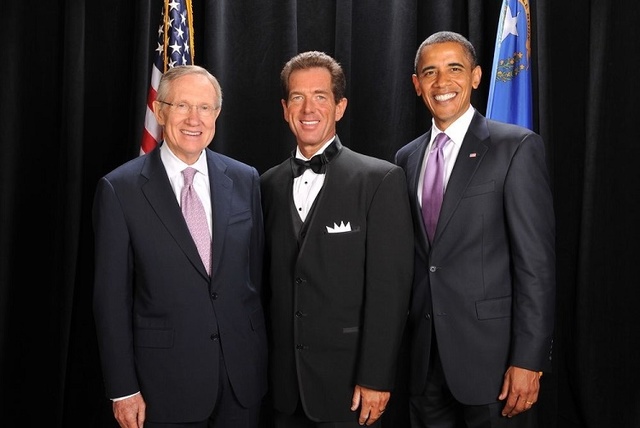

WASHINGTON — Harry Reid didn’t start the partisan polarization that has stymied Congress in recent years. But he played a central role in sharpening the tone of discourse on Capitol Hill, dividing lawmakers and eroding the collegiality that once was a hallmark of the U.S. Senate.
In that atmosphere, Reid is stepping down from leadership and leaving the chamber with few regrets — and an armful of legislative victories from three decades of serving the Democratic caucus and his home state of Nevada.
His legacy includes the Affordable Care Act, a major Senate rule change on filibusters and success in blocking nuclear waste shipments to Yucca Mountain — to name just a few accomplishments.
At age 77, Reid remains irascible, unrepentant but humbled.
“I consider it a wonderful privilege, a blessing in my life, that I have been able to serve in the Senate with my background, where I came from, to be able to be a senator, let alone be the leader of the Senate, for as long as I have been,” Reid said in a wide-ranging interview with the Review-Journal in his Capitol office.
“It was very rewarding to me. I hope it has been for the people in the state of Nevada,” Reid said from the ornate Senate Democratic Leader’s suite.
The past weeks have seen Reid at the center of tributes and farewells from friends and adversaries who have brushed off the bitter partisan fights to regale colleagues with anecdotal stories, chestnuts and laurels.
“It is no exaggeration to say that America wouldn’t have accomplished all we have these past eight years — or the past three decades — without Harry Reid,” President Barack Obama said in a statement to the Review-Journal.
Obama said Reid is “as tough and as shrewd as they come, unafraid to do the right thing, and has never stopped fighting for folks who can’t fight for themselves.”
Felled recently by an accident with an exercise band that left him with eye injuries that require care at several District of Columbia hospitals, Reid said he plans to spend most of his time back in Nevada when he leaves the Senate on Jan. 3.
In a touching farewell this month, Reid, said he and his wife, Landra, would transition into a new life, not dwell on the past, and “look to the future” in a role outside Congress.
ANGRY OUTBURSTS
The soft-spoken speech was as much a part of Reid’s public persona as the angry outbursts directed at national leaders.
He once called President George W. Bush a “loser” and a “liar,” he claimed Sen. Republican Leader Mitch McConnell was “classless” and he denounced President-elect Donald Trump as “a sexual predator who lost the popular vote.”
Reid later apologized for calling Bush a loser, but not a liar, said he gets along well with McConnell and recently said Trump wasn’t so bad.
But the intemperate name-calling became a character trait — one disdained by Republicans.
McConnell wrote in his memoir that Reid had a “Dr. Jekyll and Mr. Hyde personality” and was rhetorically challenged.
“If a scalpel will work, he picks up a meat ax,” McConnell said.
It’s all part of a larger-than-life personality that he used to guide Democrats in the Senate for 17 years as leader. First elected to the U.S. House in 1982, Reid served two terms before being elected to the Senate. He assumed the leadership role after Sen. Tom Daschle lost re-election in 2004.
As party loyalties hardened, the outbursts became more commonplace.
“As a staffer you were terrified, because you never knew exactly what he was going to say. Sometimes it worked out well and sometimes it didn’t,” said Jim Manley, a former chief spokesman for Reid.
“He had an amazing ability to speak his mind,” Manley said.
Many defend Reid for standing up to Republicans at a time when GOP lawmakers banded together to halt progress by Obama and Democrats on an economic stimulus bill, judicial appointments and the Affordable Care Act, known as Obamacare.
“Reid didn’t start the polarized politics in the Senate. He simply reflected the reality of it. Sweetness and humility don’t get you very far in that lion’s den,” said Larry Sabato, the director of the Center for Politics at the University of Virginia.
Sabato said Reid, a high school pugilist, “continued his boxing career in the Senate, and he landed plenty of punches and knockouts.”
Reid, in the interview, said that what some may interpret as provocative speech was just a defense against a Republican onslaught that began when Bush tried to privatize Social Security, claiming his election was a mandate to do so.
Reid said he could not stand by and let Republicans block Obama’s initiatives, a tactic aimed at defeating the president’s re-election bid in 2012.
“So any rancor the people think I created, I did nothing — I was just trying to get the Senate to operate in a way that I think it should run. If that has caused some people to think I have caused some partisan disruption here they are wrong,” Reid said.
“I was only trying to protect the country. So that’s my take on that.”
A SON OF SEARCHLIGHT
Reid grew up in the sun-baked desert town of Searchlight, about 60 miles south of Las Vegas. The son of a miner who committed suicide, Reid recalls the hardships of life in the town with 13 brothels, gold mines and nothing else.
His mother washed laundry in the speck of civilization that sits between mountain ranges in the Mojave Desert. The town today remains a blur to travelers on the highway to California and Arizona.
Reid said growing up there prepared him for the future.
“I would recommend that everyone prepare themselves the way I did: be raised in a town that is made up of prostitutes, be raised in a town where there is no working going on to speak of — other than prostitution — there is no telegraph, there is no infrastructure to speak of, no railroad, nothing,” Reid said.
“So my recommendation is have everybody live the way I did: a house with an outside toilet, heat your house with a wood stove,” he chortled. “That prepares you pretty well for anything that comes up.”
The town, like Reid, has changed over the years. His name is now emblazoned on the elementary school, a road sign and in a display at the local museum of Searchlight’s most notable people, including the late Hollywood fashion designer Edith Head.
It was there that he met Landra, a Jewish girl, and punched her father before the two eloped and converted to Mormonism.
Growing up in Searchlight, Reid said he never practiced any religion at home. That came after marriage.
To this day, the couple remain extremely close, with five children and 19 grandchildren, former aides said.
In his goodbye speech to the Senate, Reid said: “She’s my first love. It will never end.”
It is a private side of Reid that the public doesn’t see.
“He’s a very gentle soul. I spent a lot of time with him behind closed doors,” said Neil Kornze, a former Reid staffer who now serves as the director of the U.S. Bureau of Land Management.
Staffers and political experts also said that Reid’s quiet nature as a lawmaker prompted many to underestimate his ability.
Democratic senators and party loyalists praise his acumen as a strategist and tactician.
Kornze said he recalls a fellow staffer once telling him that Reid was one of the best strategic thinkers in the country.
“What my friend said was that he’s not just one step ahead of you, it’s that he’s three steps ahead of you and around the corner and you don’t even know that a corner is coming,” Kornze said.
Manley said some of Reid’s rhetoric was in fact designed to “stir things up to see how people react. If they overreact, he finds a soft spot, if they don’t, he has to deal with them in a different way.”
“My theory is most politicians avoid getting into controversy. For Sen. Reid, it’s not necessarily a bad thing to stir it up a little and see where people are headed,” Manley said.
STIRRING THE POT
Nothing stirred the pot more than when Reid proposed changing Senate rules in 2013 to stop Republicans from filibustering Obama’s judicial nominees. It was known as the “nuclear option,” a change in Senate tradition that lowered the threshold required to pass lower court nominees from 60 votes to a simple majority of the Senate.
Senate Democrats, led by Reid, detonated the nuclear option when Republicans blocked Obama’s nominations for three vacancies on the District of Columbia Circuit Court of Appeals, a bench considered a stepping stone for the U.S. Supreme Court.
The rule change passed by Democrats allowed all three nominees to be confirmed, as well as lower court nominees bottled up in the Senate who were appointed by the president and awaiting a confirmation vote.
In addition to Republican opposition, many Democrats were queasy about passing the rule change because no Senate majority lasts forever, said Carl Tobias, a former UNLV law professor now with the University of Richmond School of Law.
But even long-serving Democratic senators like Patrick Leahy of Vermont, who served as Judiciary Committee chairman, agreed to the rule change “because they felt GOP obstruction had left them no alternatives,” Tobias said.
With the election of Trump and a Republican-led Senate, Democrats will now face a difficult task blocking presidential nominees to the courts.
“The nuclear option will probably come back to haunt Democrats on lower court nominees because they will need GOP votes to filibuster,” Tobias said.
Republicans could now go further and change the rule on Supreme Court nominations, lowering the threshold to stop debate from 60 votes to a simple majority. That would prevent Democrats from blocking a high court vacancy that opened when Associate Justice Antonin Scalia died in February.
Reid defends his decision to launch the nuclear option, changing the rules despite the likelihood that Republicans could gain control of the Senate and use the simple majority against Democrats.
“I know that turnabout is fair play,” he said.
Reid insists he did it “out of survival for the country.”
He said Republicans were blocking nominees to the D.C. Circuit Court, refused to hear judicial nominations on lower courts and were trying to break unions and eliminate agencies like the National Labor Relations Board.
Reid said he was glad he changed the rule, which led to confirmation of 98 federal judges and the filling of many sub-Cabinet seats in the new Obama administration.
“If I had to do it over again I would do it again in a second. Now does that mean it may work to the Democrats’ disadvantage during the Trump years? Maybe so, but that’s the way it is,” Reid said during the interview.
YUCCA MOUNTAIN
Reid also takes pleasure in blocking the use of Nevada as a storage site for radioactive refuse.
In a parting shot during his Senate speech, Reid warned against renewed efforts by a Trump administration or Congress to open Yucca Mountain as a repository for nuclear wastes.
Reid has led a bipartisan Nevada congressional delegation in opposition to the nuclear waste storage site, which lies just an hour north of Las Vegas casinos and the city’s booming tourism industry.
Obama cut funding to the project years ago, and now the cost is prohibitive, Reid insists.
Reid cautioned that if anyone attempts to revive the repository, they should “bring a checkbook, a great, great big one.” And he dismisses recent speculation of a Yucca Mountain revival as futile.
“It’s not going to happen. There is not money to do it, it’s not necessary to do it, it’s against science — it’s a bad, bad deal,” Reid said.
Despite his continued zeal against the project, Reid said he will not lead opposition to it once he leaves the Senate next month. He said he is content with stepping down from leadership, the Senate, and letting others carry the torch.
“I will be happy to be involved in causes, but I am not going to be the point person. Someone else can do that,” Reid said.
At this point, Reid insists he’s ready to move on in life and weigh options of employment outside the Senate.
“I accept the fact that I am not who I was,” Reid said. After Jan. 3, “I am a former senator and I am not going to try to pretend that I am still the same guy I was during the many years I was involved in public service.”
Contact Gary Martin at gmartin@reviewjournal.com. Follow @garymartindc on Twitter.
RELATED
Harry Reid bids farewell to Senate after 30 years
Soft-spoken, sharp-tongued Sen. Harry Reid bids farewell
Obama, Reid lead 20th annual Lake Tahoe preservation celebration






